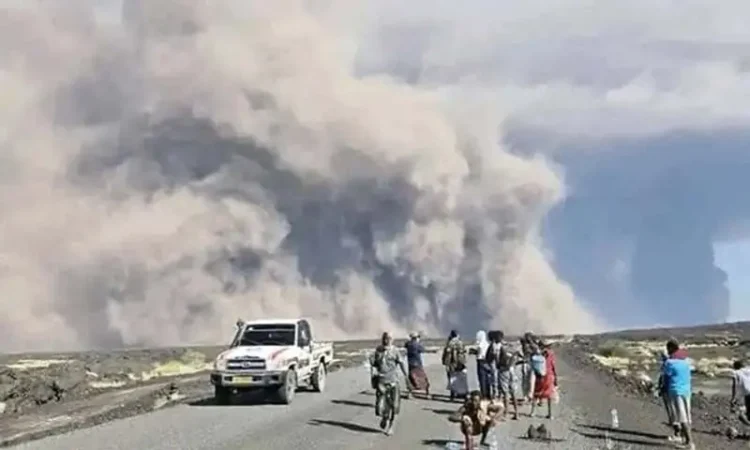Web Desk (MNN); A volcanic ash cloud generated by an eruption in north-eastern Ethiopia is expected to drift toward southern Pakistan after moving over Yemen and Oman, according to the Toulouse Volcanic Ash Advisory Centre (VAAC).
The Hayli Gubbi volcano, located in Ethiopia’s Afar region near the Eritrean border and roughly 800 kilometres from Addis Ababa, erupted on Sunday for several hours. It was the volcano’s first recorded eruption in nearly 12,000 years.
The eruption sent dense ash columns as high as 14 kilometres into the atmosphere, spreading across nearby villages and drifting toward the Arabian Sea. The volcano, rising about 500 metres, lies in the tectonically active Rift Valley.
Met Office spokesperson Anjum Nazeer Zaighum, however, clarified that Karachi would not experience any effects from the ash cloud, which is expected to pass over the deeper parts of the Arabian Sea.
He said the latest projections indicated that the impact would be limited to Oman, the deep Arabian Sea, and the Mumbai flight information region. The ash cloud is moving at an altitude of around 50,000 feet.
Zaighum added that today the ash cloud was observed 60 nautical miles south of Gwadar. A formal warning has been issued to relevant authorities and remains in effect.
Local residents in Ethiopia told The Addis Standard that the eruption occurred around eight kilometres from the main mountain. According to the outlet, Afar TV described the blast as a massive eruption, with residents reporting that the sound was stronger than anything previously experienced.
Residents interviewed by the station said the blast and its tremors were felt across Djibouti, Tigray, and several towns in the Wollo region. The heavy ash cloud plunged surrounding areas into near-darkness.
The Addis Standard, citing BNO News, reported that the eruption began at 8:30am UTC and continued with explosions throughout the afternoon. VAAC advisories indicated that ash rose to about 45,000 feet before activity subsided and later updates suggested the eruption had ceased.
The Smithsonian Institution’s Global Volcanism Program confirmed that Hayli Gubbi has no known eruptions during the Holocene. Volcanologist Simon Carn of Michigan Technological University also noted that the volcano has no recorded activity in the last 12,000 years.
FlightRadar shared an update at 3:31am showing the projected movement of the ash cloud toward the Arabian Peninsula and Arabian Sea. Pakistan lies in the projected path, with the cloud expected to approach the region within roughly 18 hours.









































































